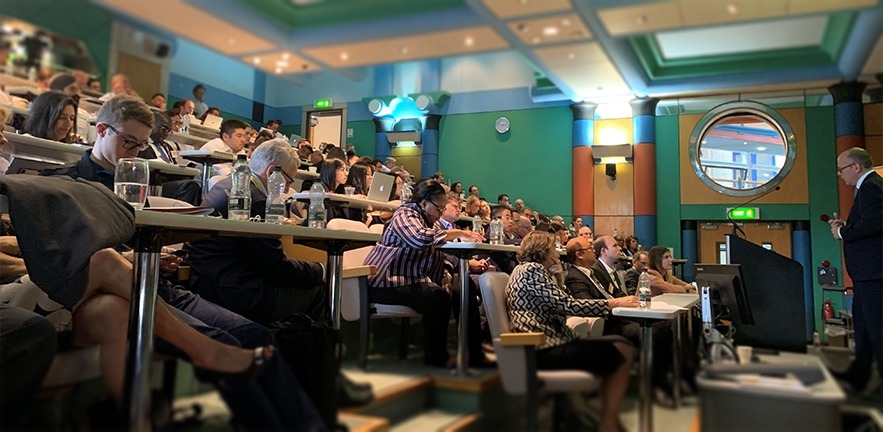Size and scale of Facebook’s Libra cryptocurrency poses “questions for society and government”, a top Financial Conduct Authority tells the annual conference of the Cambridge Centre for Alternative Finance.
The size and scale of Facebook’s planned Libra cryptocurrency poses “questions for society and government,” a top official of the UK’s Financial Conduct Authority (FCA) told the annual conference of the Cambridge Centre for Alternative Finance at Cambridge Judge Business School on 2 July.
“If this comes to fruition, Libra could be very significant indeed,” said Christopher Woolard, Executive Director of Strategy and Competition at the FCA. “Its size and scale will pose questions for society and government more generally about what is acceptable and desirable in this space.
“Historically, this may have been a sector that has lived by the mantra of ‘move fast and break things’, but the issues raised here require deep thought and detail,” Woolard told the conference.
Facebook last month announced plans to launch the Libra token, which will be backed by a pool of currencies and short-term sovereign bonds, and with founding members that include big firms such as Visa, PayPal, Uber and Vodafone.
Woolard said that the term “stablecoin” – although widely used to describe initiatives such as Libra – is of limited utility as it’s not seen as a distinct category of assets, adding that a “stablecoin” could sit within or outside the FCA’s regulatory framework depending on the circumstances of how it is used.
Woolard said that “stablecoin” could refer to a cryptocurrency backed by a fiat currency, which in some cases could constitute e-money – and in such cases “the issuer needs to be authorised as an e-money issuer” and comply with all e-money and payment services regulations. But ‘stablecoin’ could also apply to algorithmically controlled tokens, and could amount to regulated products such as collective investment schemes.
A taskforce set up by the FCA, the Bank of England and the UK Treasury has classified cryptoassets into three broad types: exchange tokens such as Bitcoin using distributed ledger technology (DLT); security tokens amounting to a specified investment; and utility tokens which can be redeemed for a product or service typically provided through a DLT platform.
“A ‘stablecoin’ could fall within or between” regulatory categories, which “makes us question how useful this one term – ‘stablecoin’ – is when it comes to labelling all these different tokens,” Woolard said in his keynote address to the Cambridge conference. “Depending on its structure it could be many things – for instance, a derivative, a unit in a collective investment scheme, another kind of security or e-money.
“We also question whether tokens governed by algorithms or underpinned by other cryptoassets are necessarily ‘stable,’” he said.
In his remarks, Woolard also emphasised the need for regulators to see beyond the “jargon” and “hype” of cryptoassets to understand the substance of transactions using these innovations. “It is crucial that we also think about the reality – the technical details, the technology, and the legal position – in other words, we ourselves need to go behind the scenes.”
The fourth annual conference of the Cambridge Centre for Alternative Finance (CCAF) had as its theme “Transforming Alternative Finance: Innovation, Trust and Impact” – and many speakers focused on how trust is essential given the loss of trust in financial service providers owing to the financial crisis of the last decade.

“There’s a fundamental change in how trust is looked at in economies, and Facebook is taking advantage of that” in launching Libra, said Dr Robert Wardrop, Director of the CCAF, adding that a major challenge for regulators in dealing with an initiative like Libra is its potential scale. If the number of Libra partners reaches into the thousands, “who do you go after? It creates a practical regulatory impediment.”
Bob Wigley, Chair of the trade body UK Finance, said that the UK had generally taken a “forward-leaning approach” in its regulation, and that most regulation since the financial crisis had been needed. Yet he cautioned against the issuance of new rules by a multitude of regulators without proper co-ordination, as this can require constant upgrading of IT systems and thus hold back growth in financial services.
Alfonso Garcia Mora, Global Director of the Finance, Competitiveness & Innovation Global Practice at the World Bank, said that fintech has huge potential to help the 1.7 billion adults around the world who are still unbanked, many of whom have a mobile phone. About 235 million of those unbanked receive agricultural payments in cash, 100 million get government payments in cash, and 260 million use cash for remittances. “Fintech is transforming the financial system,” he said, “but has not yet reached disruptive critical mass.”

Also at the conference, a new Cambridge Bitcoin Electricity Consumption Index (CBECI) was announced. Michel Rauchs, Cryptocurrency and Blockchain Lead at the CCAF, outlined how the real-time index will allow simple comparisons of Bitcoin’s electricity usage with other uses of electricity, such as boiling water with electric tea kettles.


